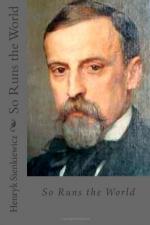Sienkiewicz being himself a nobleman, therefore naturally in his historical novels he describes the glorious deeds of the Polish nobility, who, being located on the frontier of such barbarous nations as Turks, Kozaks, Tartars, and Wolochs (to-day Roumania), had defended Europe for centuries from the invasions of barbarism and gave the time to Germany, France, and England to outstrip Poland in the development of material welfare and general civilization among the masses—the nobility being always very refined—though in the fifteenth century the literature of Poland and her sister Bohemia (Chechy) was richer than any other European country, except Italy. One should at least always remember that Nicolaus Kopernicus (Kopernik) was a Pole and John Huss was a Chech.
Historical novels began in England, or rather in Scotland, by the genius of Walter Scott, followed in France by Alexandre Dumas pere. These two great writers had numerous followers and imitators in all countries, and every nation can point out some more or less successful writer in that field, but who never attained the great success of Sienkiewicz, whose works are translated into many languages, even into Russian, where the antipathy for the Polish superior degree of civilization is still very eager.
The superiority of Sienkiewicz’s talent is then affirmed by this fact of translation, and I would dare say that he is superior to the father of this kind of novels, on account of his historical coloring, so much emphasized in Walter Scott. This important quality in the historical novel is truer and more lively in the Polish writer, and then he possesses that psychological depth about which Walter Scott never dreamed. Walter Scott never has created such an original and typical figure as Zagloba is, who is a worthy rival to Shakespeare’s Falstaff. As for the description of duelings, fights, battles, Sienkiewicz’s fantastically heroic pen is without rival.
Alexandre Dumas, notwithstanding the biting criticism of Brunetiere, will always remain a great favorite with the reading masses, who are searching in his books for pleasure, amusement, and distraction. Sienkiewicz’s historical novels possess all the interesting qualities of Dumas, and besides that they are full of wholesome food for thinking minds. His colors are more shining, his brush is broader, his composition more artful, chiselled, finished, better built, and executed with more vigor. While Dumas amuses, pleases, distracts, Sienkiewicz astonishes, surprises, bewitches. All uneasy preoccupations, the dolorous echoes of eternal problems, which philosophical doubt imposes with the everlasting anguish of the human mind, the mystery of the origin, the enigma of destiny, the inexplicable necessity of suffering, the short, tragical, and sublime vision of the future of the soul, and the future not less difficult to be guessed of by the human race in this material world, the torments of human conscience and responsibility for the deeds, is said by Sienkiewicz without any pedanticism, without any dryness.




